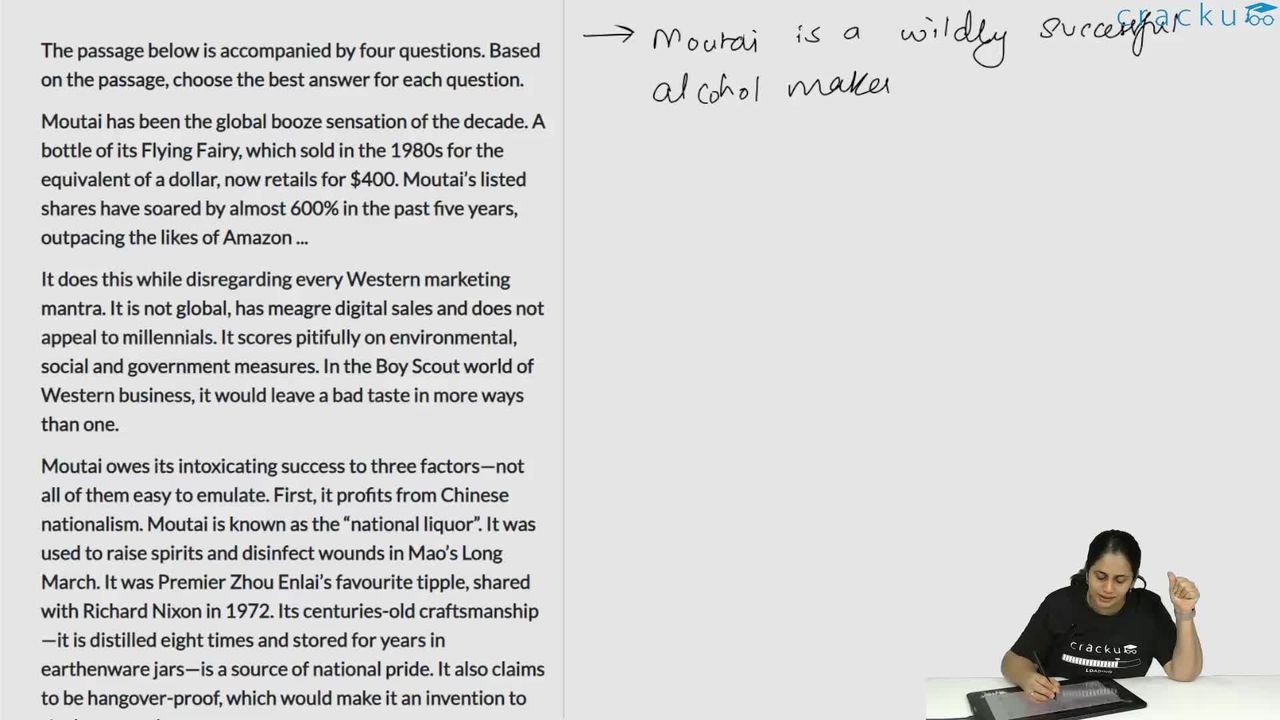Sign in
Please select an account to continue using cracku.in
↓ →
The passage below is accompanied by four questions. Based on the passage, choose the best answer for each question.
Moutai has been the global booze sensation of the decade. A bottle of its Flying Fairy, which sold in the 1980s for the equivalent of a dollar, now retails for $400. Moutai’s listed shares have soared by almost 600% in the past five years, outpacing the likes of Amazon ...
It does this while disregarding every Western marketing mantra. It is not global, has meagre digital sales and does not appeal to millennials. It scores pitifully on environmental, social and government measures. In the Boy Scout world of Western business, it would leave a bad taste in more ways than one.
Moutai owes its intoxicating success to three factors—not all of them easy to emulate. First, it profits from Chinese nationalism. Moutai is known as the “national liquor”. It was used to raise spirits and disinfect wounds in Mao’s Long March. It was Premier Zhou Enlai’s favourite tipple, shared with Richard Nixon in 1972. Its centuries-old craftsmanship—it is distilled eight times and stored for years in earthenware jars—is a source of national pride. It also claims to be hangover-proof, which would make it an invention to rival gunpowder ...
Second, it chose to serve China’s super-rich rather than its middle class. Markets are littered with the corpses of firms that could not compete in the cut-throat battle for Chinese middle-class wallets. And the country’s premium market is massive—at 73m-strong, bigger than the population of France, notes Euan McLeish of Bernstein, an investment firm, and still less crowded with prestige brands than advanced economies. Moutai is to these well-heeled drinkers what vintage champagne is to the rest of the world ...
Third, Moutai looks beyond affluent millennials and digital natives. The elderly and the middle-aged, it found, can be just as lucrative. Its biggest market now is (male) drinkers in their mid-30s. Many have no siblings, thanks to four decades of China’s one-child policy—which also means their elderly parents can splash out on weddings and banquets. Moutai is often a guest of honour.
Moutai has succeeded thanks to nationalism, elitism and ageism, in other words—not in spite of this unholy trinity. But it faces risks. The government is its largest shareholder—and a meddlesome one. It appears to want prices to remain stable. Exorbitantly priced booze is at odds with its professed socialist ideals. Yet minority investors—including many foreign funds—lament that Moutai’s wholesale price is a third of what it sells for in shops. Raising it could boost the company’s profits further. Instead, in what some see as a travesty of corporate governance, its majority owner has plans to set up its own sales channel ...
In the long run, its biggest risk may be millennials. As they grow older, health concerns, work-life balance and the desire for more wholesome pursuits than binge-drinking may curb the“Ganbei!” toasting culture [heavy drinking] on which so much of the demand for Moutai rests. For the time being, though, the party goes on.
In the context of the passage, we can infer that to succeed in the liquor industry in China, a marketing firm must consider all of the following factors affecting the Chinese liquor market EXCEPT that
Let's evaluate the given choices and check if they are consistent with the information in the passage -
Option A: According to the passage, this is not true. The author emphasises that Moutai deliberately avoids targeting the middle class, as the competition in that market is intense, and instead focuses on the super-rich. This suggests that marketing to the middle class is not as lucrative or straightforward as it might appear.
Option B: The passage mentions that the Chinese government is Moutai's largest shareholder and potentially plays a role in controlling the prices of products, which is a key factor for any firm in this market to consider. Furthermore, the author discusses how the government might further interfere with the operations in this space: [“... in what some see as a travesty of corporate governance, its majority owner has plans to set up its own sales channel ...”]
Option C: The author highlights that the premium market in China is still growing and not overcrowded with luxury brands, indicating a potential opportunity for firms targeting high-end consumers.
Option D: The passage states that many firms have failed in their attempt to cater to the middle class due to fierce competition. This is a valid consideration for any firm looking to enter the market.
Hence, Option A is the correct choice.

Click on the Email ☝️ to Watch the Video Solution
Create a FREE account and get:
Educational materials for CAT preparation